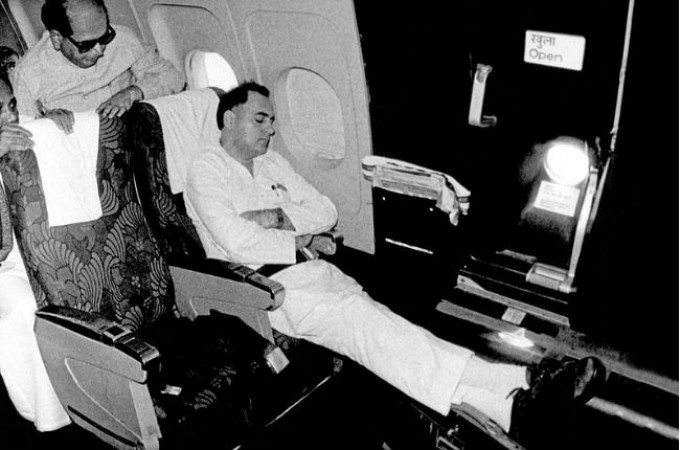
New Delhi: Today is the death anniversary of Rajiv Gandhi, the youngest PM of the country. Rajiv Gandhi's wife Sonia and children Rahul and Priyanka paid tributes to him today. But did you know that Rajiv Gandhi never wanted to get into politics, after being a pilot after studying, he was living his life well, but after the assassination of Indira Gandhi, he was forced to enter politics. If his brother Sanjay Gandhi had been alive, Rajiv Gandhi might not have had to come to politics. Rajiv Gandhi played an important role in modernising the country and bringing the computer to India, but his name was also associated with many controversies. There were some controversies which, even today, remain a weapon for the opposition of Congress.
1984 Sikh riots: 'When a big tree falls, the ground shakes'
After the assassination of Indira Gandhi, people, especially Congress workers, had become aggressive against Sikhs. The biggest havoc was on Delhi. For nearly three days, the killing of Sikhs continued on the streets and streets of Delhi. Sikhs were looking for shelter to save lives. Indira Gandhi was assassinated on October 31 and a few days later, the new Rajiv government announced to celebrate Indira's birthday (till her death). There was mourning in the house of the Sikhs, and on 19 November 1984, on Indira Jayanti, Rajiv made a very irresponsible statement. Addressing the crowd at the Boat Club, he said, "Whenever a big tree falls, the earth shakes a little. Rajiv Gandhi's statement sent a message to the people: "As if an attempt was being made to justify these killings.'' This statement created a lot of sensation at that time and the Congress party still has to make a lot of fuss to justify it.
Bhopal gas tragedy: Warren Anderson flees the country
No Indian can forget the Bhopal gas tragedy of the black night of 1984. When death spread all over the city. Of those who were sleeping in their homes, thousands of them remained asleep, poisonous gas started leaking from the Factory of Union Carbide in Bhopal. As soon as they saw it, thousands of people fell into its grip. In a matter of hours, 3000 living human beings became corpses. On December 7, four days after the Bhopal gas tragedy, Union Carbide owner Warren Anderson arrived in Bhopal, where he was also arrested. But he was granted bail for just Rs 25,000. He was kept under house arrest at the Bhopal Guest House of Union Carbide, but inside, the entire system was helping him escape. Overnight, Anderson was brought to Delhi from Bhopal by a government plane. In Delhi, he reached the residence of the US Ambassador and then from there he left for Mumbai and Mumbai to the US by a private airline. Former Madhya Pradesh aviation director RS Sodhi had also made a statement in which he had said that he had received a call asking him to keep a government aircraft ready from Bhopal to Delhi. Anderson boarded the same plane and reached Delhi. At that time, the Superintendent of Police of Bhopal and the District Magistrate went on their own to board Anderson on the plane. At that time, the CM of Madhya Pradesh was Arjun Singh and Rajiv Gandhi was the PM. According to intelligence documents of the US intelligence agency CIA, the Rajiv Gandhi government itself had ordered the release of Anderson, responsible for the death of thousands of people.
Shah Bano case: Rajiv government bows to hardliners
In 1986, Rajiv Gandhi was just learning politics. Meanwhile, the case of Shah Bano of Indore in Madhya Pradesh came into the limelight. Shah Bano's brother-in-law and famous lawyer Mohammad Ahmed Khan gave her Triple Talaq after 43 years of marriage. Shah Bano was evicted from the house with his five children. The amount of Mehr fixed at the time of the marriage was returned by Ahem Khan, but Shah Bano demanded alimony per month. There was no choice but to go to court. The court ruled the case in favour of Shah Bano and ordered Ahmed Khan to pay alimony of Rs 500 per month. Shah Bano's move instilled courage in other Muslim women as well, which made men of the Muslim community extremely angry. However, in the Shah Bano case, Rajiv Gandhi had earlier put forward his Minister of State for Home Arif Mohammad Khan. Mohammad Arif also supported Shah Bano in the Lok Sabha. He said in the Lok Sabha that according to the Quran, in any case, a reasonable arrangement should be made for the Talaq-bound woman. But under pressure from the conservatives, the Rajiv government pulled back its steps, and at the same time, using its power in the Lok Sabha, overturned the Supreme Court's decision. At that time, Rajiv Gandhi made a few Muslims happy by doing the politics of religion, but left the Muslim women for a dark future, after which there were thousands of cases where Triple Talaq ruined the lives of Muslim women.
What are the prices of petrol and diesel in your city today? know here
FDI inflows reached an all-time high of USD83.57 bn dollars in 2021-22
RBI recommends a dividend to the Centre of Rs 30,307 crore for FY22